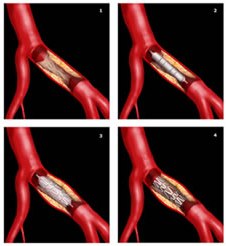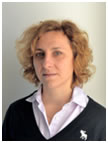 |
||
Accueil > FORUM TERATEC > Programme > Atelier 7
Application of Optimization & CFD in Surgical Planning for Percutaneous Coronary Intervention Silvia POLES Résumé : When cardiologists treat narrowed or blocked heart arteries as found in coronary heart diseases, they typically use off-the-shelf available stents. Placing such stents permanently opens the arteries at locations with build-up of cholesterol-laden plaques. Recent research resulted in an Optimus-managed simulation process that optimizes medical intervention for improving local coronary blood circulation.
The optimization results that were achieved underline the need for patient-specific stents that optimize local blood circulation for heart disease patients undergoing medical treatment. Compared to treatment using standard coronary stents, optimized patient-specific stents were found to improve local blood circulation characteristics by over 20% - thus improving the patient’s comfort and quality of life.
Biographie : Silvia POLES |
![]() La participation à cet atelier est gratuite sous réserve des places disponibles
La participation à cet atelier est gratuite sous réserve des places disponibles
![]() L'enregistrement en ligne est obligatoire pour y assister. Cliquer ICI pour vous inscrire.
L'enregistrement en ligne est obligatoire pour y assister. Cliquer ICI pour vous inscrire.
Le secteur de la biologie et de la santé fait de plus en plus appel aux technologies de l’information et de la communication et notamment au calcul haute performance, comme par exemple pour le traitement de grandes masses de données ou d’informations (biologiques (génomique, protéomique) ou cliniques (imagerie médicale, épidémiologie…)) ou pour la simulation de phénomènes complexes (modélisation moléculaire, physiome, mécanismes des maladies, effets des médicaments, conception de nano-systèmes, de biomatériaux, d’organes artificiels ou de robots chirurgicaux ou d’assistance au handicap……). On peut également citer l’ensemble des activités de surveillance et d’assistance au malade (smart systems, télémédecine). Ainsi le champ applicatif de ces technologies couvre l’ensemble des besoins médicaux dans le domaine de la prévention, du diagnostic et de la prise en charge thérapeutique.
Après un exposé introductif du Dr. François Ballet, président du Comité R&D du pôle de compétitivité MEDICEN, sur les grandes orientations actuelles de l’usage du HPC en santé, un point a été fait dans deux domaines d’application spécifiques : La biologie intégrative, en particulier pour la recherche et la conception de nouveaux médicaments, L’usage de l’imagerie médicale et des techniques de réalité virtuelle.
L’objectif de cet atelier organisé par TERATEC et MEDICEN a été, au travers de ces présentations et des débats associés, de faire émerger les grands axes des initiatives futures associant Santé et HPC.

